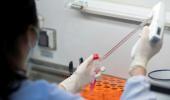There is no definitive conclusion that the COVID-19 pandemic originated from a lab in China, the White House has said.

The US government is still looking at the pandemic's origin, which has been the subject of vigorous debate among academics, intelligence experts and lawmakers.
National Security Council Coordinator for Strategic Communications John Kirby's remarks came following a report that the United States Energy Department has concluded the virus most likely leaked from a lab in China.
The Wall Street Journal on Sunday, citing a classified intelligence report recently provided to the White House and key members of Congress, said the virus that drove the COVID-19 pandemic, killing close to 7 million people globally, most likely emerged from a laboratory leak in China.
Responding to questions about the report, Kirby said: "The intelligence community and the rest of the government are still looking at this. There's not been a definitive conclusion, so it's difficult for me to say, nor should I feel like I should have to defend press reporting about a possible preliminary indication here.
"What the President (Joe Biden) wants is facts. He wants the whole government designed to go get those facts, and that's what we're doing. And we're just not there yet," Kirby told reporters at a daily White House news conference on Monday.
The Huanan market in central China's Wuhan city was the epicentre of the pandemic. From its origin there, the SARS-CoV-2 virus rapidly spread to other locations in Wuhan in late 2019 and then to the rest of the world.
According to the Wall Street Journal and the New York Times, the department's conclusion was made with low confidence, meaning there was a level of certainty that was not high.
"And when we're there yet and if we have something that is ready to be briefed to the American people and the Congress, then we're going to do that," he said.
Kirby said that President Biden made finding the origins of COVID a priority right when he came into office. And he's got a whole-of-government effort designed to do that, he said.
"There is not a consensus right now in the US government about exactly how COVID started. There is just not an intelligence community consensus," he said.
"The President believes it's really important that we continue that work and that we find out, as best we can, how it started so that we can better prevent a future pandemic. The idea here is to get ahead of it so that should there be another one or should there even be the signs of another one, we can better get ahead of it," he said.
The emergence of the pandemic heightened tensions between the United States and China, which US officials alleged was withholding information about the outbreak.
China, which has placed limits on investigations by the World Health Organisation, has disputed that the virus could have leaked from the Wuhan Institute of Virology, one of its labs in Wuhan, and has suggested it emerged outside China.
China on Monday rejected the report, saying the origins-tracing of the pandemic 'is about science and should not be politicised'.
Foreign Ministry spokesperson Mao Ning said in Beijing that international experts have considered the theory that the pandemic might have leaked from a Chinese laboratory as 'extremely unlikely'.
She said it is a science-based, authoritative conclusion reached by the experts of the WHO-China joint mission after field trips to the lab in Wuhan and in-depth communication with researchers.
The US demands for more information about the origins of the pandemic shows how China is refusing to play by global rules in this case, in allowing follow-up virological investigations, CNN reported.
Responding to another question on China, Kirby said that one of the things that concerned the US about the spy balloon episode, aside from the fact that it was clearly designed to spy from a high altitude over potentially sensitive military sites, is that the lines of communication weren't as open, particularly on the military side, as they need to be.
China and the US have been trading barbs since the Biden administration earlier this month shot down what it said was a spy balloon that had drifted over the continental US.
The balloon, which Beijing denies was a government spy vessel, spent a week flying over the United States and Canada before being shot down off the Atlantic Coast earlier this month on President Biden's orders.
"So, the President maintains that his goal in the relationship is competition, not conflict. That has not changed, even in the wake of that spy balloon event.
"But one of the things that really We need to move forward on opening up lines of communication, particularly on the military-to-military lane. And as you know, those were shut down by the Chinese after then-Speaker Pelosi went to Taiwan," he said.











 © 2025
© 2025